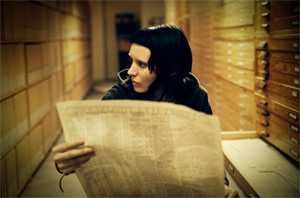The ‘Girl’ Is Good, but Why Bother?
Here’s a paradox I’ve never encountered in several decades of movie reviewing: a perfectly well-made film that there is absolutely no compelling reason to rush right out and see—especially if you’ve been paying attention to recent developments in popular culture.Here’s a paradox I’ve never encountered in several decades of movie reviewing: a perfectly well-made film that there is absolutely no compelling reason to rush right out and see.
Here’s a paradox I’ve never encountered in several decades of movie reviewing: a perfectly well-made film that there is absolutely no compelling reason to rush right out and see—especially if you’ve been paying attention to recent developments in popular culture.
I’m talking about “The Girl With the Dragon Tattoo.” First, there was the late Stieg Larsson’s best-selling thriller, made the more poignant by the author’s sudden death of a heart attack before the book was published in Sweden in 2005. It has basically not been absent from the best-seller lists—at least in the United States—ever since. And two years ago there was a perfectly respectable Swedish-made film version of the novel—faithful to the book both in plot and spirit though, frankly, visualizing its several brutal passages proved more upsetting than I had thought they might be. Now we have a widely anticipated English language version of the thing: A-list director (David Fincher), a more or less major star (Daniel Craig), a promising leading lady (Rooney Mara) and, again, a faithful adaptation of the source material. And, truth to tell, an almost totally unnecessary movie.
I mean, Stieg Larsson is not exactly Jane Austen, is he? There is no particular need to see how the various adapters of Austen’s work have treated the delightful sacred texts. As a matter of fact, there is nothing particularly delightful about Larsson’s work. Indeed, it is almost embarrassing to summarize the plot of “Dragon Tattoo.” Suffice it to say that a journalist named Mikael Blomkvist—temporarily and unfairly in professional disgrace—is hired by the paterfamilias of the fabulously wealthy (and almost entirely dysfunctional) Vangers to investigate the disappearance (and presumed murder) of a young woman, a family member, some 40 years earlier. Blomkvist, in turn, hires Lisbeth Salander to assist him. Herein lies the novels’ originality. She is a computer hacker of genius. She is AC-DC sexually. She is also grievously abused sexually. With Blomkvist, she forms what is surely the oddest couple in recent crime fiction. They, of course, solve the antique murder mystery.
They also became the engine driving the current fad for Scandinavian noir. The Larsson books are not the best of this breed. The veteran Henning Mankell — stolid, but solid — is a reliable performer in the field, particularly in the way he permits his leading detective to develop a wayward life of his own (when last encountered he was suffering from incipient Alzheimer’s). And then there’s the excellent Norwegian, Jo Nesbo, a particularly writerly craftsman who has been bringing his alcoholic detective along in a subtle and—rare in this field—amusing fashion. Next to these authors, Larsson seems to me pretty crude.
But that’s more or less the point, isn’t it? Mankell and Nesbo, among others, have not come up with a character matching Salander in slightly kinky sexuality and, more important, the ability to enlist our sympathy. One always feels there is something like a normal “girl” struggling to emerge from a past blighted by so much horrendous history.
There is, as well, another factor at work in the success of these books. We are pleased to think of the Scandinavian countries as paragons of normalcy—a little dull, come right down to it — wrapped as they are in their socialist ease and comfort. In some sense Salander rescues them for eccentricity, if not downright weirdness. A salvageable perversity attends her comings and goings. She would probably be right at home in American crime stories, but in these novels (and Fincher’s film) she is like a flash of lightning.
Which means that, sooner or later, a lot of people are going to see this movie. When all the football games have reached intolerable levels of boredom, when all the presents have been exchanged at the stores, all the post-Christmas sale items have been dutifully pawed through, an irresistible impulse to attend this thrice-told story is going to take us over. I find this, oddly, an acceptable way to waste two and a half hours. Most of the year’s five or six really good movies are not going to be playing anyway. And like the good little boys and girls that we are, we line up to see a slick retelling of a tale we know all too well. It is the function of fairy tales—even darkish and banal ones—to provide such mild pleasures.
Your support matters…Independent journalism is under threat and overshadowed by heavily funded mainstream media.
You can help level the playing field. Become a member.
Your tax-deductible contribution keeps us digging beneath the headlines to give you thought-provoking, investigative reporting and analysis that unearths what's really happening- without compromise.
Give today to support our courageous, independent journalists.



You need to be a supporter to comment.
There are currently no responses to this article.
Be the first to respond.